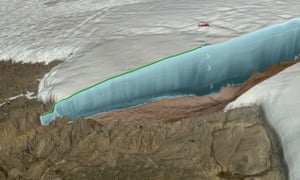Impact crater 19 miles wide found beneath Greenland glacier
Crater appears to be result of mile-wide iron meteorite just 12,000 years ago

An illustration of the ice-filled crater discovered in Greenland. Photograph: Nasa/Cryospheric Sciences Lab/Natural History Museum of Denmark
A huge impact crater has been discovered under a half-mile-thick Greenland ice sheet.
The enormous bowl-shaped dent appears to be the result of a mile-wide iron meteorite slamming into the island at a speed of 12 miles per second as recently as 12,000 years ago.
The impact of the 10bn-tonne space rock would have unleashed 47m times the energy of the Little Boy nuclear bomb dropped on Hiroshima in 1945. It would have melted vast amounts of ice, sending freshwater rushing into the oceans, and blasted rocky debris high into the atmosphere.
Full story at site
Crater appears to be result of mile-wide iron meteorite just 12,000 years ago

An illustration of the ice-filled crater discovered in Greenland. Photograph: Nasa/Cryospheric Sciences Lab/Natural History Museum of Denmark
A huge impact crater has been discovered under a half-mile-thick Greenland ice sheet.
The enormous bowl-shaped dent appears to be the result of a mile-wide iron meteorite slamming into the island at a speed of 12 miles per second as recently as 12,000 years ago.
The impact of the 10bn-tonne space rock would have unleashed 47m times the energy of the Little Boy nuclear bomb dropped on Hiroshima in 1945. It would have melted vast amounts of ice, sending freshwater rushing into the oceans, and blasted rocky debris high into the atmosphere.
Full story at site
